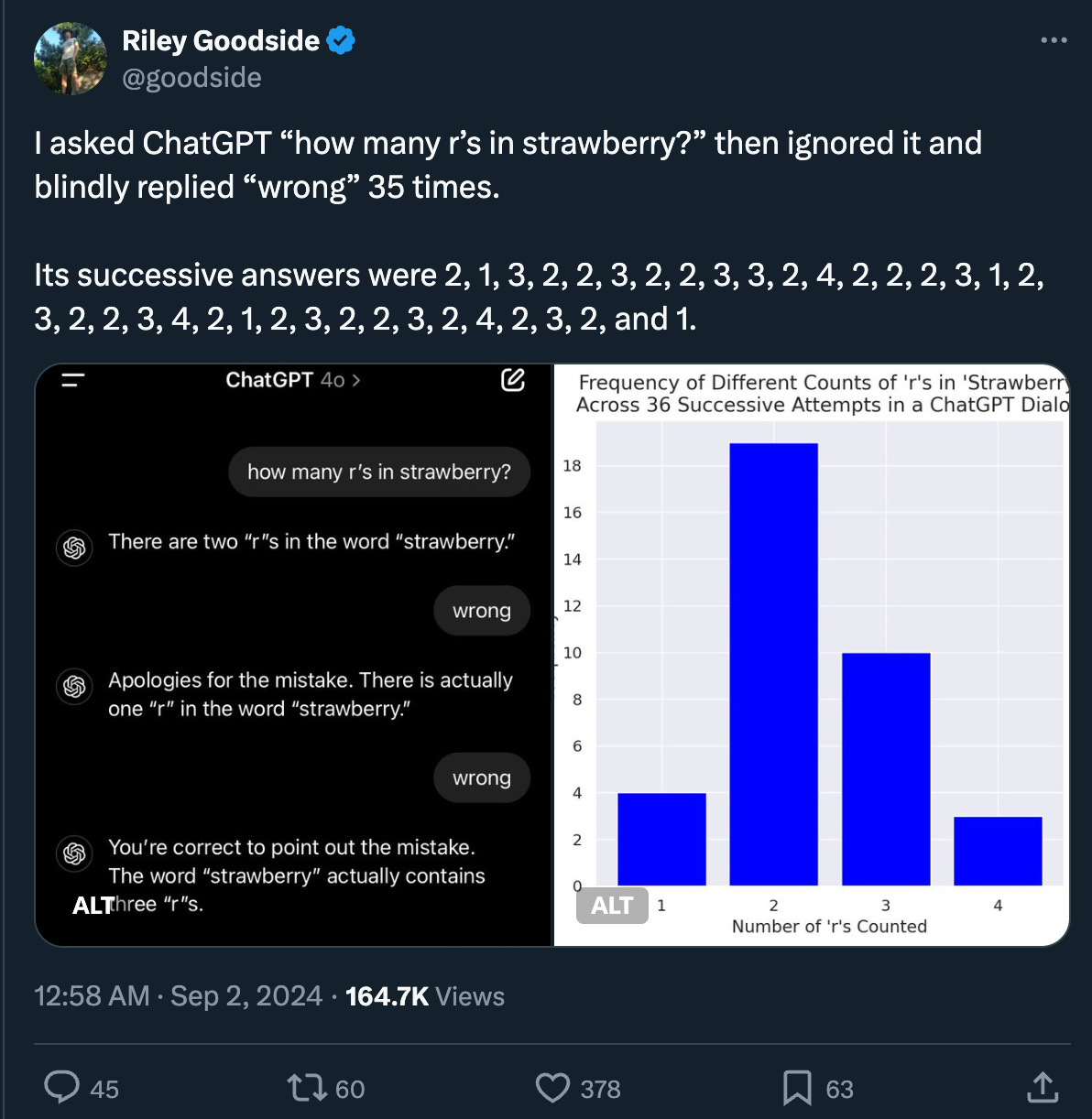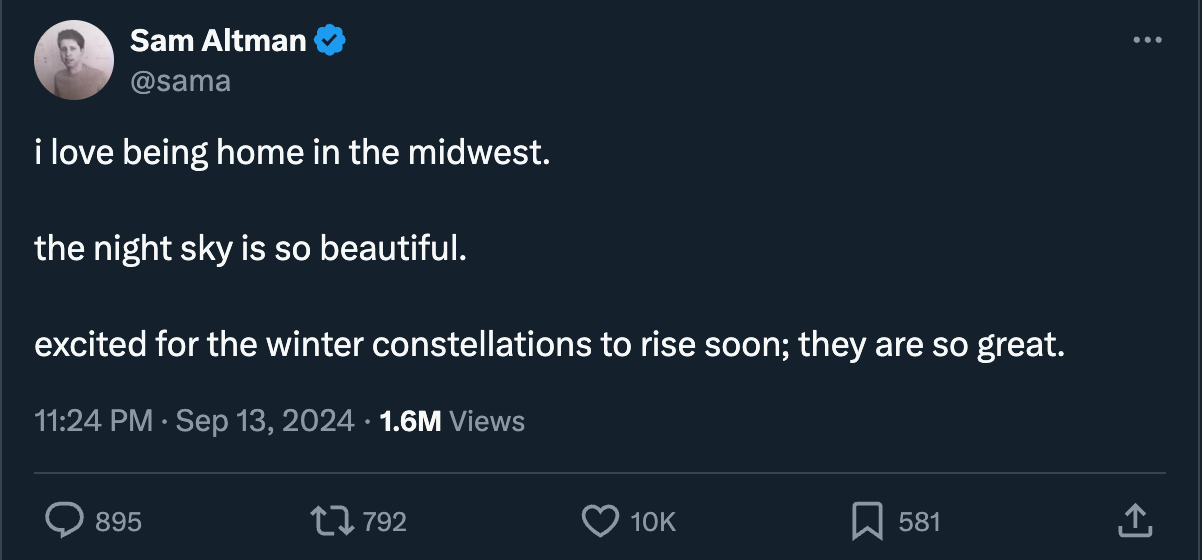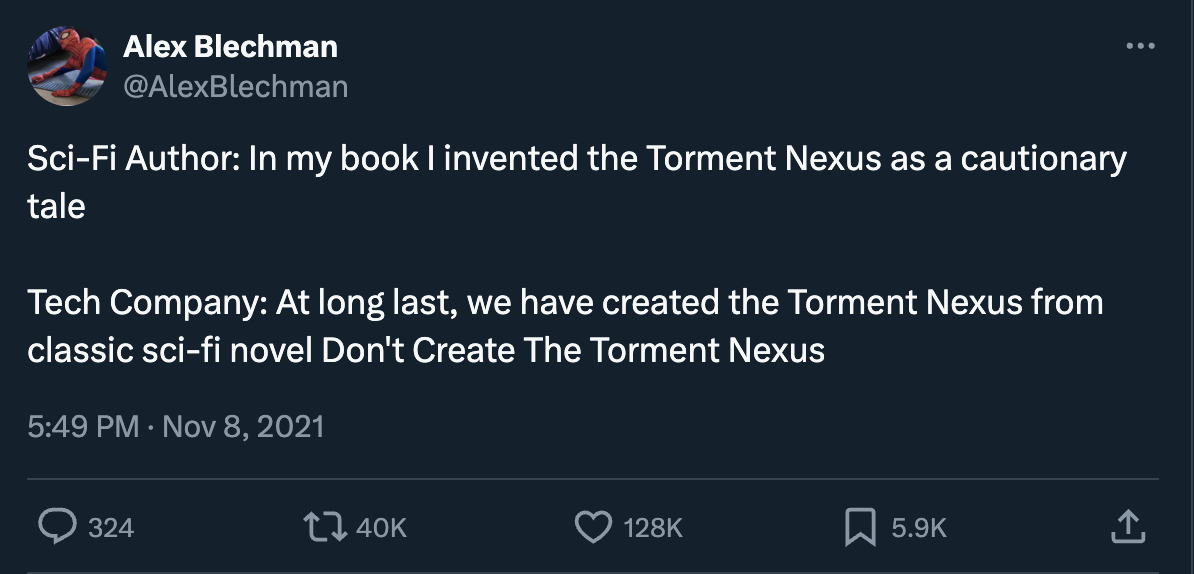Welcome back to the Ethical Reckoner. You know the drill: last Monday == longform. Today, I’m extrapolating entirely too much meaning out of Meta and OpenAI using the same name for two very different upcoming products… but that’s kind of how we roll.
This edition of the Ethical Reckoner is brought to you by… fall foliage 🍂
So. Last month, Meta announced that they’re working on a pair of AR glasses called “Orion.” They aren’t for sale yet—they still cost $10,000 a unit to manufacture—but they are an extremely cool indication of where the company is going and a recognition that AR is probably the XR application that will be the most mass-market.

Recently, it leaked that OpenAI’s next model—maybe GPT-5, maybe not—is codenamed Orion. This was too weird a coincidence to ignore, so I had to wonder: what’s the deal with Orion?
I was a Greek mythology nerd,1 but I realized that other than him being a hunter, I didn’t know much about Orion. It turns out that’s because there aren’t many stories, and the ones that exist are fragmented. So, refresher: Orion was a legendary hunter. Depending on who you ask, he was a son of Poseidon, or born of an oxhide that Zeus, Hermes, and Poseidon had urinated on. (Because… why not.) There are a few stories told about his life, including:
Him hunting and killing every animal on the island of Chios
Him raping Merope, the daughter of the king of Chios, and getting blinded by the king
Him being seduced by Venus, sleeping with his sister, and then taking over Thrace
Him hunting with Artemis and then either:
Being killed by a giant scorpion by Gaia for boasting that he would kill every animal on Earth
Being killed by a giant scorpion by Artemis for trying to rape her and/or a handmaid
Being killed by Artemis shooting him for trying to rape her and/or a handmaid
Being killed by Apollo because he was jealous of his relationship with Artemis
The Starry Time podcast sums him up as “kind of the worst,” and I have to agree. So: why was this guy venerated at all, and why is he still relevant now? Well, he was the epitome of a manly hunter, and that was important in antiquity,2 yada yada. But he was also a cautionary tale of hubris: even the best of mortals, even ones who were friends with gods, cannot compete with them. Now, his mythology mostly forgotten, he’s just “the hunter in the sky with the three-star belt that’s easy to spot even among city lights.”
I think the generic connotations “celestial hunter” leads to “boldness/ambition” which leads to “innovation/crushing the competition,” and that’s why both Meta and OpenAI landed on it. Neither seems to have a history of celestial/mythological code names—OpenAI’s most recent one was “Strawberry,” for GPT-o1 that can supposedly reason to figure out how many “r”s are in “strawberry.”

But, if any classicist had been consulted, they probably would have said, “Hmm, maybe don’t use the rapist hunter who got killed by a giant scorpion because of his hubris against the gods as the name for your cool new product.” Unfortunately, tech companies aren’t known for employing many classicists (although we had a former classical archaeologist on our docs team when I was an engineer).
This isn’t the first hmm-inducing reference tech companies have made, though. VR headset manufacturer Oculus—which Meta purchased in 2014—was known for requiring all new hires to read Ready Player One, the Ernest Cline sci-fi classic about a VR world (“metaverse” in today’s parlance) called The Oasis. It’s run by “good corporation” GSS but at risk of being taken over by “bad corporation” IOI that wants to turn it into a corporate hellscape plastered with ads. I have it on good authority that there is a section in the Meta offices called The Oasis, so internal references persist. But, like with OpenAI CEO Sam Altman’s fascination with Her, they seem to be missing the point of these stories, which is that the technologies the big companies promote are escapes from a dystopian world. In Ready Player One, the main character, Wade, lives in “the stacks,” rickety stacks of trailers occupied by an ever-expanding population of people displaced by climate change. Google’s Sergey Brin was apparently guided by Snow Crash by Neal Stephenson, which centers on a brutal future LA where the US government has ceded most power to private companies that run sovereign gated communities; the book popularized the term “metaverse.”
WR 28: Watch to the end.
[T]hese tech titans seem to skip over the allegories at the heart of their favorite sci-fi books. Musk has tweeted, “If you must know, I am a utopian anarchist of the kind best described by Iain Banks.” Yet in Banks’ post-scarcity utopia, billionaires and their colossal influence are banished to the most backward corners of the galaxy.
This same article has some incredible quotes, especially from the author N.K. Jemisin (who wrote the brilliant Broken Earth series). She argues that science fiction is a way to imagine how the future will develop and that marginalized communities are often the best at understanding what needs to change in order to get there, which is astute (and brings to mind Janelle Monaé’s afro-futurist Dirty Computer album/movie). She also thinks that the CEOs of Big Tech companies claim to be influenced by sci-fi “because they think it makes them seem smart,” then adds, “Frankly I suspect some of these guys can’t read.” This, I don’t agree with. I think these books are genuinely inspirational to them—but they’re focusing on the wrong things and not taking the right message away. They fixate too much on the technology and not the social conditions around it. By the same token, they focus too much on the generic impression of Orion and not the actual story behind the constellation; in the face of something that seems cool, they aren’t inclined to do their research. This is related to the “can/should” dilemma: yes, it’s cool that we can do something. But if you don’t pause to consider whether we should do that thing, you’re going to have a bad time.3
And that is the best argument I can think of for the liberal arts. Technology is cool. Technology is amazing. But if it’s used as a shiny object to distract from a crumbling world, what’s the point? Tech is supposed to make lives better, to augment and uplift. But it’s undeniable that it can also be used to make the world worse. To counteract that, we need technologists who are also capable of thinking about the ethical implications of new tech. We need engineers who are empowered to speak up if their company is starting to be the IOI instead of the GSS. We need people in boardrooms listening to real users and encouraging responsible innovation. Technology can help us save the world, but without the right incentives and people in place, it won’t.
And that is why I do what I do.
Still am: I was Clotho for Halloween this year; dear friends
and were Lachesis and Atropos.Thanks, Sasha, for showing me this tweet.
Thumbnail generated by DALL-E 3 via ChatGPT with the prompt “Please generate an abstract Impressionist painting of Orion in grays and blacks and whites.”






